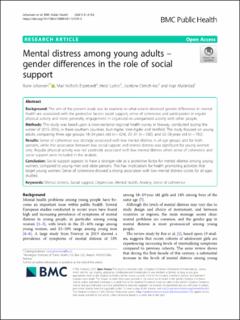Mental distress among young adults – gender differences in the role of social support.
Johansen, Rune; Espetvedt, Mari Katrine Nicholls; Lyshol, Heidi; Clench-Aas, Jocelyne; Myklestad, Ingri
Peer reviewed, Journal article
Published version
Permanent lenke
https://hdl.handle.net/11250/2831578Utgivelsesdato
2021Metadata
Vis full innførselSamlinger
- Artikler [5068]
- Publikasjoner fra CRIStin FHI [7544]
Sammendrag
Background The aim of the present study was to examine to what extent observed gender differences in mental health are associated with the protective factors social support, sense of coherence and participation in regular physical activity and more generally, engagement in organized or unorganized activity with other people. Methods This study was based upon a cross-sectional regional health survey in Norway, conducted during the winter of 2015–2016, in three southern counties; Aust-Agder, Vest-Agder and Vestfold. The study focused on young adults, comparing three age groups; 18–24 years old (n = 624), 25–31 (n = 582), and 32–38 years old (n = 795). Results Sense of coherence was strongly associated with low mental distress in all age groups and for both genders, while the association between low social support and mental distress was significant for young women only. Regular physical activity was not positively associated with low mental distress when sense of coherence and social support were included in the analysis. Conclusion Social support appears to have a stronger role as a protective factor for mental distress among young women, compared to young men and older persons. This has implications for health promoting activities that target young women. Sense of coherence showed a strong association with low mental distress scores for all ages studied.
